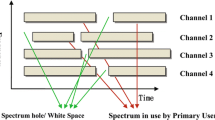Abstract
Collaborative spectrum sensing is proposed to improve the detection performance in cognitive radio (CR) networks. However, most of the current collaborative sensing schemes are vulnerable to the interference of the malicious secondary users (SUs). In this paper we propose a reputation-based collaborative spectrum sensing scheme to improve the security of cooperative sensing by mitigating the impacts of misbehaviors. The fusion center calculates the reputation rating of each SU according to their history reports to weight their sensing results in the proposed scheme. We analyze and evaluate the performance of the proposed scheme and its advantages over previous schemes in expansibility and integrity. Simulation results show that the proposed scheme can minimize the harmful influence from malicious SUs.
Similar content being viewed by others
References
FCC Spectrum Efficiency Working Group. Report of the spectrum efficiency working group [EB/OL]. (2011-01-20) [2002-11-15]. http://www.fcc.gov/sptf/reports.html.
Haykin S. Cognitive radio: Brain-empowered wireless communications [J]. IEEE Journal on Selected Areas in Communications, 2005, 23(2): 201–220.
Sahai A, Hoven N, Tandra R. Some fundamental limits on cognitive radio [C]//Proceedings of Allerton Conference on Communication, Control and Computing. Piscataway, NJ: IEEE, 2004: 131–136.
Ghasemi A, Sousa E S. Collaborative spectrum sensing for opportunistic access in fading environments [C]//First IEEE International Symposium on New Frontiers in Dynamic Spectrum Access Networks. Piscataway, NJ: IEEE, 2005: 131–136.
Sun C, Zhang W, Letaief K B. Cluster-based cooperative spectrum sensing in cognitive radio systems [C]//IEEE International Conference on Communications. Piscataway, NJ: IEEE, 2007: 2511–2515.
Chen R, Park J M, Bian R. Robust distributed spectrum sensing in cognitive radio networks [C]//INFOCOM, the 27th Conference on Computer Communications IEEE. Piscataway, NJ: IEEE, 2008: 1876–1884.
Mishra S M, Sahai A, Brodersen R W. Cooperative sensing among cognitive radios [C]//ICC’06. IEEE International Conference. Piscataway, NJ: IEEE, 2006: 1658–1663.
Xu S, Shang Y, Wang H. Double thresholds based cooperative spectrum sensing against untrusted secondary users in cognitive radio networks [C]//Vehicular Technology Conference IEEE 69th. Piscataway, NJ: IEEE, 2009: 1–5.
Kaligineedi P, Khabbazian M, Bhargava V K. Secure cooperative sensing techniques for cognitive radio systems [C]//ICC’08. IEEE International Conference. Piscataway, NJ: IEEE, 2008: 3406–3410.
Hu F, Wang S, Cheng Z. Secure cooperative spectrum sensing for cognitive radio networks [C]//Military Communications Conference MILCOM. Piscataway, NJ: IEEE, 2009: 1–7.
Gao F, Yuan W, Liu W, et al. A robust and efficient cooperative spectrum sensing scheme in cognitive radio networks [C]//Communications Workshops (ICC), 2010 IEEE International Conference. Piscataway, NJ: IEEE, 2010: 1–5.
Chen H, Jin X, Xie L. Reputation-based collaborative spectrum sensing algorithm in cognitive radio networks [C]//Personal, Indoor and Mobile Radio Communications, 2009 IEEE 20th International Symposium. Piscataway, NJ: IEEE, 2009: 582–587.
Zhao T, Zhao Y. A new cooperative detection technique with malicious user suppression [C]//ICC’09. IEEE International Conference. Piscataway, NJ: IEEE, 2009: 1–5.
Ma J, Li Y. Soft combination and detection for cooperative spectrum sensing in cognitive radio networks [C]//Global Telecommunications Conference, GLOBECOM. Piscataway, NJ: IEEE, 2007: 3139–3143.
Author information
Authors and Affiliations
Corresponding author
Additional information
Foundation item: the National Natural Science Foundation of China (No. 60802058) and the SMC-“Chen-Xing” Young Scholar Foundation of Shanghai Jiaotong University
Rights and permissions
About this article
Cite this article
Zhao, Sk., He, D., Li, Wh. et al. Reputation-based collaborative spectrum sensing scheme in cognitive radio networks. J. Shanghai Jiaotong Univ. (Sci.) 16, 641–647 (2011). https://doi.org/10.1007/s12204-011-1204-6
Received:
Published:
Issue Date:
DOI: https://doi.org/10.1007/s12204-011-1204-6




